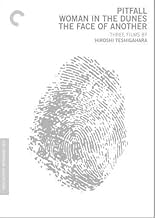An artistic film that defies simple analysis. There are ghosts, but it's not a ghost story. There is a crime scene investigation, but it's not a murder mystery. It's got surreal moments, but it's not strictly a fantasy.
At the heart of this allegory is a very down to earth social criticism of Japan's mining industry. The film shows us the backbreaking work of miners in the Kyushu region, one that has been desolated by industry. Pay is meager and workers are sometimes hunted down for desertion. There are unions but they are weak, and industrialists use one of the many ploys at their disposal to keep them that way - they pit the leaders of different groups against one another. The mysterious man in the white suit to me is simply a symbol for big business. Without a trace of compassion, it leaves entire communities as ghost towns, raping the land, and leaving its workers eternally hungry.
The visuals in the film are stark and brilliant. Teshigahara boldly puts images and sequences on the screen that make us wonder what's happening, and where he's going with this. The film may seem disjointed and odd, but bear with it, or watch it a couple of times (as I did).
It's certainly not cheery though. There is so little hope against unseen forces that leave people in squalor, and have men fighting one another in the mud of life. A shop owner is raped by a cop and it's witnessed by a boy. It's very unfortunate that this seems to evolve into acceptance or consent on her part after a jump cut (the painful to watch trope that 'no' eventually means 'yes' with enough force or persistence). It's a small moment, but this woman sells candy bearing Disney characters, a clear (and sad for Japan) post-war reference. And what of the future? A little boy in a barren landscape who has seen several murders, a rape, and impassively rips apart a live frog? It's bleak.

![Trailer [OV]](https://m.media-amazon.com/images/M/MV5BM2RlZGYyMjAtOTFhNS00ZmZmLWJkYmEtYTg2ODM5ZTBhN2RlXkEyXkFqcGdeQXRyYW5zY29kZS13b3JrZmxvdw@@._V1_QL75_UX500_CR0)























